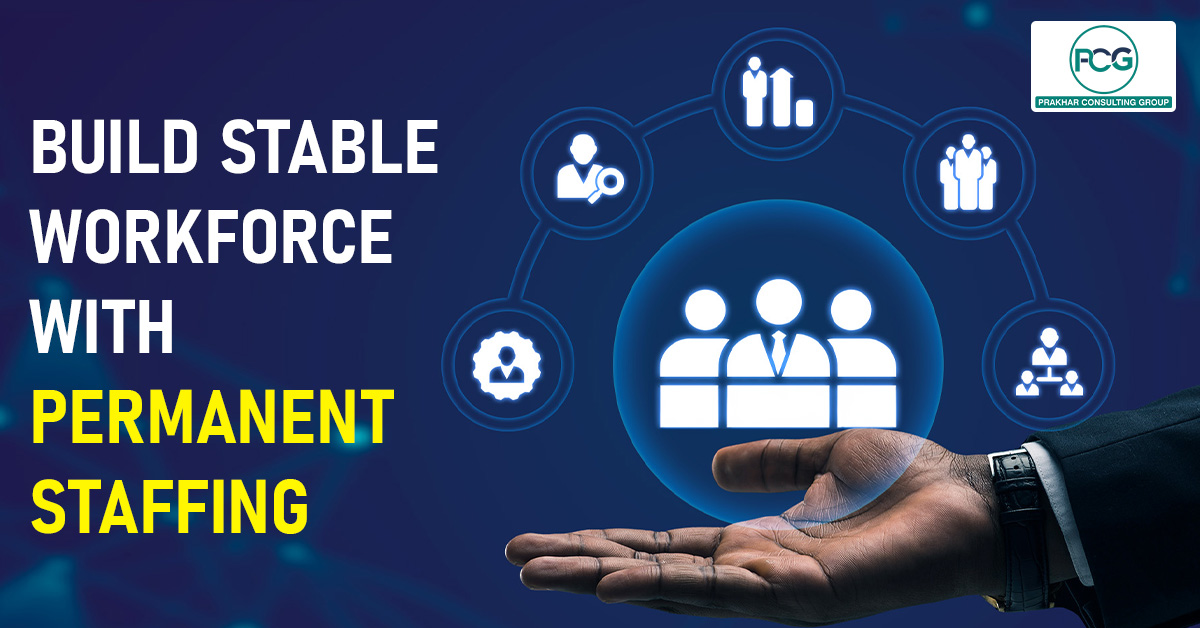The Future of IT & Non-IT Hiring in India: Trends, Challenges & Strategic Solutions
Author: Mayank Puri

India’s workforce is one of its greatest assets; but tapping into the right talent is increasingly becoming a challenge for employers. With a population as diverse as its industries, hiring in India involves navigating different languages, cultures, skill sets, and expectations. For businesses, especially those in growth mode, finding the right people at the right time is more than a necessity- it’s a strategic priority.
Industry thought leader Debjani Ghosh, President of NASSCOM, has emphasised, “Skill is the new currency. Organisations must hire for learnability, not just current expertise.”
Post-pandemic, the workplace has undergone a transformation. Digital adoption has accelerated across every sector, from start-ups to legacy enterprises. Alongside this, new business models have emerged, remote-first operations, hybrid roles, and gig-based projects are now part of everyday workforce planning. In this fast-moving environment, traditional hiring methods are struggling to keep pace with the demand for agility, specialisation, and cost control.
That’s where expert-led hiring solutions come into play. Organisations looking to compete effectively must lean on partners who understand the landscape and offer tailored support, particularly in technology domains. Providers of IT Recruitment Services in India are bridging the talent gap by connecting companies with qualified professionals faster, more efficiently, and with greater reliability.
This blog explores what’s changing in the Indian hiring ecosystem, why it matters to your business, and how future-ready companies are staying ahead- not just by hiring quickly, but by hiring smartly and sustainably.
Hiring Trends in India: IT vs Non-IT Sectors in Focus
1. Understanding the Two Sides of the Talent Coin
IT and Non-IT hiring are fundamentally different in scope, yet increasingly interdependent in the modern workplace. While IT hiring deals with roles such as developers, cybersecurity analysts, DevOps engineers, and data scientists, Non-IT hiring caters to roles in administration, finance, customer support, operations, HR, sales, and beyond.
In both domains, companies require agile, skilled professionals who can adapt quickly to shifting project needs, changing technologies, and evolving compliance standards. This is where expert partners offering IT services play a crucial role in bridging the gap between open positions and the right talent pools.
2. What Is Driving Change in the Indian Hiring Landscape?
Several macro and micro trends are reshaping how companies approach hiring:
- Digital Transformation: Cloud, AI, IoT, and automation are creating demand for niche IT skills.
- Hybrid Workforce Models: A mix of permanent and contractual teams is becoming the norm.
- Geographic Expansion: Tier 2 and Tier 3 cities are emerging as untapped talent reservoirs.
- Cost Sensitivity: Businesses are prioritising flexible workforce models to optimise costs.
- Regulatory Compliance: Labour codes and GST norms demand precision in workforce documentation.
The World Economic Forum’s Future of Jobs Report 2023 projects that over 85 million jobs may be displaced, while 97 million new roles may emerge, driven by automation and AI. Source: [WEF Future of Jobs 2023]
3. Key Challenges Businesses Face While Hiring
In a roundtable hosted by People Matters, CHROs from leading firms including Tata Communications and Infosys reiterated the critical role of flexible staffing and workforce analytics in driving long-term business performance.
Despite India’s massive workforce, employers routinely cite the following hurdles:
- High Attrition Rates: Especially in entry-level and tech roles.
- Mismatch of Skills vs. Job Requirements: A disconnect between what candidates offer and what roles demand.
- Slow Hiring Cycles: Extended timelines due to lack of screening bandwidth or poor sourcing.
- Overreliance on Job Portals: Leading to generic candidate pools, not culture-fit hires.
- Scalability Concerns: Especially for project-based or seasonal requirements.
Addressing these concerns requires strategic hiring models and not just reactive hiring practices.
4. Strategic Solutions That Work in the Indian Context
To overcome the above challenges, progressive companies are implementing a blend of smart hiring solutions:
a. Partnering with Recruitment Experts
Collaborating with specialised talent partners brings access to pre-vetted profiles, industry insights, and scalable models. This saves time, cuts down on poor-fit hires, and ensures faster turnarounds.
For example, Prakhar Consulting Group is known for providing reliable Contractual Hiring Services in India, helping companies deploy skilled professionals on flexible terms without compromising quality.
b. Building a Blend of Permanent and Contractual Teams
Many organisations are now balancing long-term employees with project-based staff. This model allows for business continuity while ensuring agility.
c. Investing in Campus-to-Corporate Programmes
By building early pipelines through colleges, companies can mould fresh graduates into productive assets. This also reduces long-term hiring costs.
d. Using Technology for Better Hiring Decisions
AI-enabled ATS, video interviews, automated screening, and data analytics tools are reducing the load on internal HR teams while increasing quality of hire.
5. Sector-Specific Hiring Trends to Watch
India’s talent demand is not one-size-fits-all. Different sectors are undergoing distinct shifts in how they hire, what they prioritise, and which roles are rising. Here’s a look at 12 industries you should be watching:
1. Information Technology (IT)
The demand for full-stack developers, cloud engineers, AI/ML specialists, and DevOps experts continues to soar. Remote hiring has removed location barriers, giving companies access to top-tier talent across India.
2. Banking, Financial Services & Insurance (BFSI)
Risk management, digital compliance, cyber-security, and customer onboarding professionals are in high demand. Fintech players are also hiring aggressively in product and analytics.
3. Retail & FMCG
With frequent attrition in frontline roles, companies are relying on staffing partners for bulk hiring, store operations, merchandising, and supply chain roles.
4. Healthcare & Pharmaceuticals
The sector is recruiting for regulatory affairs, research scientists, diagnostics, and health-tech roles. Demand surged post-COVID and continues with digital health integrations.
5. Manufacturing & Logistics
There is a spike in demand for skilled technicians, warehouse staff, automation operators, and supply planners. Just-in-time delivery models need dependable shift-based staffing.
6. Telecommunications
5G rollouts are driving demand for network engineers, installation experts, and backend infrastructure support staff; especially in Tier 2 cities.
7. EdTech & Education
From curriculum designers to digital marketing specialists and student counsellors, the EdTech sector is recruiting across skill bands to support hybrid learning models.
8. E-Commerce
Warehouse executives, last-mile delivery staff, customer care agents, and UX designers are being hired at scale; particularly during festive and sales seasons.
9. Hospitality & Travel
As travel rebounds, hiring has picked up for chefs, housekeeping staff, customer experience executives, and hotel operations managers.
10. Automotive & EV Sector
This space is looking for R&D engineers, battery tech specialists, safety compliance experts, and skilled mechanical labour for assembly lines.
11. Real Estate & Construction
Project managers, architects, site supervisors, and compliance officers are in demand as urban infrastructure grows.
12. Media & Entertainment
Hiring spans digital content creators, streaming operations, ad-sales, and community management as content consumption shifts online.
Across sectors, skills now outweigh degrees- organisations want adaptability, tech fluency, and execution readiness.
6. Going Beyond Hiring: Payroll, Compliance, and Onboarding
Effective hiring doesn't end at appointment letters. Smooth onboarding, accurate documentation, and timely salary disbursals are all part of the equation.
This is where experienced partners like Prakhar Consulting Group step in, also serving as a trusted Payroll Processing Company in India. Their systems ensure end-to-end HR compliance, statutory filings, and seamless workforce management. “Organisations that see hiring as a growth driver; not just a function- build workforces that outperform,” says Josh Bersin, global HR industry analyst. Source: Josh Bersin Academy- Talent Management Insights 2023
7. Talent Mobility and Borderless Recruitment
The traditional boundaries of recruitment are quickly dissolving. With remote and hybrid work models gaining mainstream acceptance, companies are no longer restricted to hiring within their city or region.
Today, employers are prioritising skill and availability over proximity and this shift is unlocking powerful new opportunities in both IT and Non-IT sectors.
In IT, the trend has been particularly strong. Developers, cloud architects, cybersecurity analysts, and data engineers are now being hired remotely from across the country and even internationally; thanks to cloud-based collaboration tools and decentralised team structures. However, this movement is no longer exclusive to the tech sector.
Knowledge-driven roles in customer support, finance, marketing, content, training, and HR have followed suit, making borderless hiring the new norm for many growing businesses.
This rise in talent mobility allows companies in India to tap into diverse talent pools that were previously inaccessible.
Start-ups in Tier 1 cities can now recruit operations or support staff from Tier 2 and 3 cities, while mid-sized enterprises can attract niche talent from global locations without incurring relocation or infrastructure costs. The result is a more flexible, responsive, and skill-driven workforce.
However, this flexibility also brings operational complexity. Managing a geographically distributed team requires more than just video calls and emails.
Employers must navigate varying state or international labour laws, ensure compliant onboarding processes, and adopt centralised tools for time tracking, communication, and payroll. Delays or inaccuracies in these backend processes can affect not only employee satisfaction but also legal and financial standing.
To manage this effectively, organisations must work with trusted HR and staffing partners who understand both the compliance landscape and the nuances of multi-location workforce deployment. Whether it's ensuring timely documentation, digital onboarding, or multi-state payroll coordination, having the right systems and support in place is essential.
Ultimately, talent mobility is no longer a trend; it is a strategic advantage. Businesses that embrace borderless recruitment can move faster, adapt more easily, and attract high-quality talent unconstrained by geography. And with the right frameworks in place, they can scale this model sustainably while staying fully compliant.
8. Talent Mobility and Borderless Recruitment
As organisations scale, they need visionary leaders; not just skilled employees. Executive search requires a nuanced approach, cultural alignment, and deep industry networks.
That’s why many businesses rely on a seasoned Head Hunting Firm in India like Prakhar Consulting Group, which specialises in connecting enterprises with strategic leaders across IT, operations, HR, and finance.
9. Data-Driven Recruitment and Workforce Analytics
HR leaders are turning to data to drive better decision-making. By tracking metrics like time-to-hire, cost-per-hire, candidate source performance, and post-joining attrition, businesses are redefining what hiring success looks like.
Predictive analytics tools are also gaining traction helping companies assess whether a candidate will succeed based on historical hiring data. While the technology is still evolving, early adopters are already reporting improvements in retention and job-fit.
According to a 2023 McKinsey & Company report on talent evolution, “Organisations that adopt a skills-first approach to hiring are 60% more likely to retain top performers over a two-year period.” Source: [McKinsey Talent Wins Research, 2023]
10. What Should Employers Prioritise in 2025 and Beyond?
To stay competitive and hire smarter, companies must:
a. Diversify hiring channels
Relying solely on job portals can lead to overused, generic candidate pools. Employers must tap into varied sourcing streams, referral networks, LinkedIn outreach, social media hiring, recruitment agencies, and campus partnerships. Each platform reaches a different segment of the workforce and helps uncover passive talent who are skilled but not actively applying.
b. Focus on candidate experience and employer branding
Today’s jobseekers are also brand evaluators. A smooth, respectful, and transparent hiring process leaves a lasting impression. Whether or not a candidate is selected, their experience can influence how others perceive your organisation. Simultaneously, investing in employer branding- showcasing culture, values, and career growth; helps attract like-minded professionals.
c. Introduce flexible work models
Hybrid work, gig roles, and part-time contracts are no longer fringe ideas; they’re mainstream expectations. Flexibility appeals to a wider talent pool including freelancers, women returning to the workforce, and individuals seeking better work-life balance. It’s also an effective tool for improving retention and operational resilience.
d. Track key recruitment metrics
Making informed decisions begins with measuring what matters. Employers should monitor metrics like time-to-fill, offer acceptance rate, early attrition, and quality-of-hire. These insights help HR teams pinpoint inefficiencies, fine-tune their strategies, and benchmark progress over time; turning recruitment into a data-led function.
e. Collaborate with holistic talent partners
The hiring landscape demands more than just resume sharing. Working with end-to-end talent partners ensures that sourcing, screening, onboarding, and compliance are all aligned. A strategic partner; rather than a transactional vendor- adds long-term value by offering flexible, scalable, and sector-specific hiring support.
Employers who prioritise agility, empathy, data, and partnerships will be best positioned to win the talent race. The future of hiring isn’t just about filling roles- it’s about building workforces that drive growth.
One such partner is Prakhar Consulting Group; recognised among the Best HR Consulting Services in India for its ability to combine agility with scale, and compliance with culture-fit.
Conclusion
The hiring landscape in India is transforming at a rapid pace. Whether you're recruiting for IT roles in a startup or expanding your non-tech team in a manufacturing firm, the need for a smarter, future-proof hiring strategy is non-negotiable.
By understanding key trends, embracing flexibility, and partnering with the right recruitment experts, your organisation can not only find better talent but also build a resilient, high-performing workforce.
Coming up next: We’ll take a closer look at - The top challenges Indian companies face while hiring IT professionals and how to overcome them practically.


